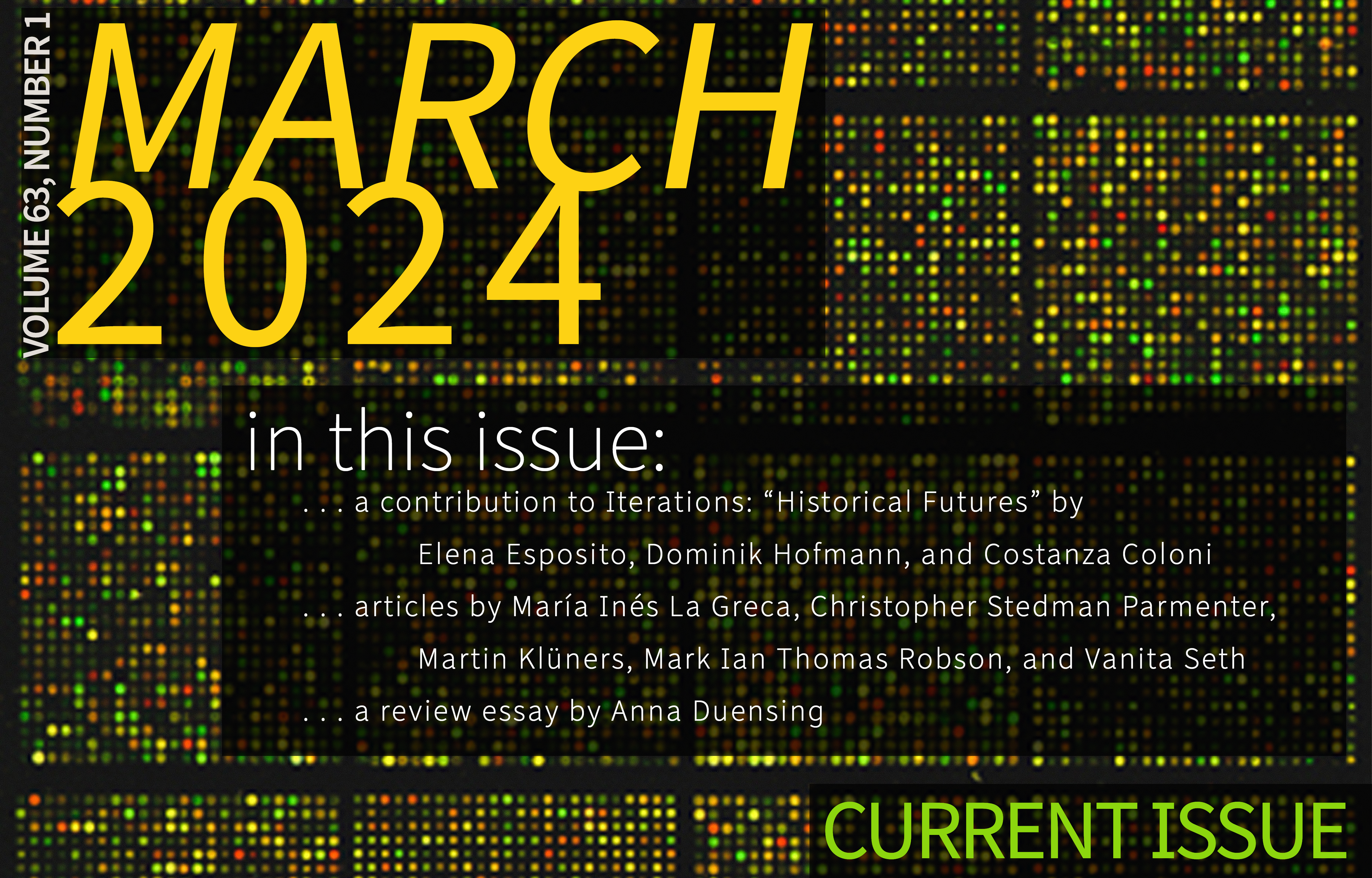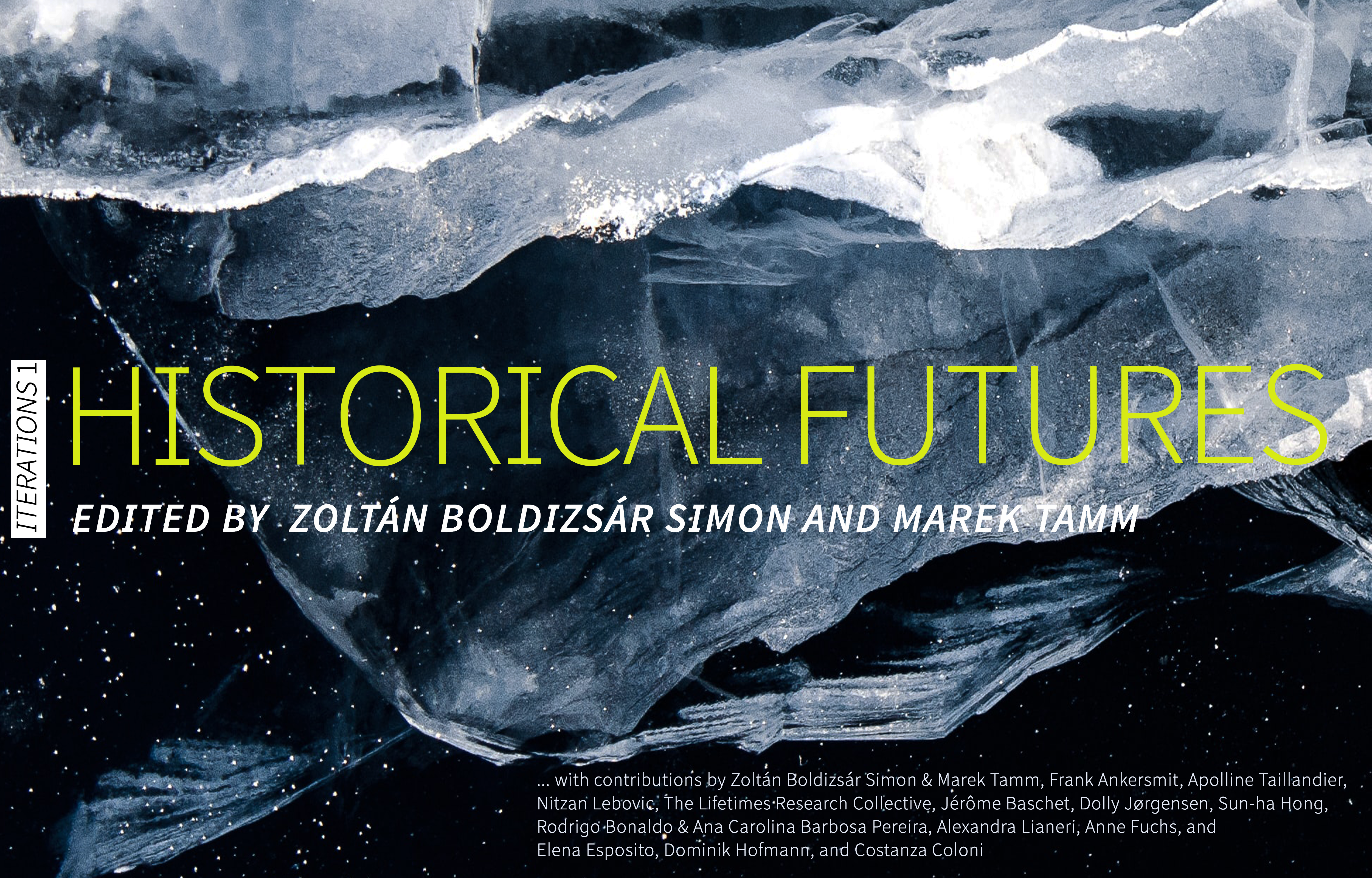Contact us
History and Theory
95 Pearl Street
Wesleyan University
Middletown, CT 06459 USA
860.685.3292
historyandtheory@wesleyan.edu
most Viewed
DIPESH CHAKRABARTY, "Anthropocene Time," History and Theory 57, no. 1 (2018)
SUN-HA HONG, "Predictions without Futures," History and Theory 61, no. 3 (2021)
RIAN THUM, "What is Islamic History?," History and Theory 58, no. 4 (2019)
DOLLY JØRGENSEN, “Extinction and the End of Futures,” History and Theory 61, no. 2 (2022)
MONIQUE SCHEER, “Are Emotions a Kind of Practice (and Is That What Makes Them Have a History)? A Bourdieuian Approach to Understanding Emotion,” History and Theory 51, no. 2 (2012)
Most Cited
MONIQUE SCHEER, “Are Emotions a Kind of Practice (and Is That What Makes Them Have a History)? A Bourdieuian Approach to Understanding Emotion,” History and Theory 51, no. 2 (2012)
DIPESH CHAKRABARTY, "Anthropocene Time," History and Theory 57, no. 1 (2018)
WULF KANSTEINER, “Finding Meaning in Memory: A Methodological Critique of Collective Memory Studies,” History and Theory 58, no. 1 (2018)
MICHAEL WERNER AND BÉNÉDICTE ZIMMERMANN, “Beyond Comparison: Histoire Croisée and the Challenge of Reflexivity,” History and Theory 45, no. 1 (2006)
ANJA KANNGIESER AND ZOE TODD, “From Environmental Case Study to Environmental Kin Study,” History and Theory 59, no. 3 (2020)
Follow us on Twitter
Current Issue
ELENA ESPOSITO, DOMINIK HOFMANN, AND COSTANZA COLONI
The openness of the future is rightly considered one of the qualifying aspects of the temporality of modern society. The open future, which does not yet exist in the present, implies radical unpredictability. This article discusses how, in the last few centuries, the resulting uncertainty has been managed with probabilistic tools that compute present information about the future in a controlled way. . . . Read more →
WITH OR AGAINST HAYDEN WHITE? REFLECTIONS ON THEORY OF HISTORY AND SUBJECT FORMATION
MARÍA INÉS LA GRECA
This article reflects on Hayden White's understanding of the subject and explores how best to move forward discussions in theory of history after his arguments about narrativity. To do so, I reconsider his arguments in light of more recent feminist and queer theorizations. Through a reconstruction of the current international new wave of feminism and LGBTQ+ activism as a rich and complex social movement that involves a narration of its own (practical) past, I will recontextualize and revaluate White's insight from the perspective of Judith Butler's theory of subject formation. . . . Read more →
CHRISTOPHER STEDMAN PARMENTER
This article discusses the impact of genomic history, a subdiscipline that emerged in the study of the ancient Mediterranean in the 2010s. In 2014, scientists first published a method for extracting genetic material, which they christened aDNA (ancient DNA), from ancient human remains in hot climates. After a decade of research, genomic history is now poised to transform our understanding of Mediterranean premodernity, centering migration and conflict as the key mechanisms for cultural change. . . . Read more →
MARTIN KLÜNERS
The long-held conviction of a mutually exclusive relationship between psychoanalysis, which allegedly proceeds purely in terms of individual psychology, and historical social science, which is interested primarily in the analysis of collectives, has significantly hindered dialogue between the disciplines. Norbert Elias's “figurational” sociology, which has been strongly influenced by psychoanalysis and group therapy, has the potential to indicate a way in which social science-oriented historical research might investigate the network of relations between individual and “collective” psychic processes without relying on artificial dichotomies. . . . Read more →
ACTS OF THOUGHT AND RE-ENACTMENT IN COLLINGWOOD'S PHILOSOPHY OF HISTORY
MARK IAN THOMAS ROBSON
This article explores one of Collingwood's most puzzling claims—that, in re-enacting a past act of thought, I can revive not just the propositional content of that act but also the very act of thought itself. This aspect of Collingwood's ideas has been largely ignored, and, when not ignored, it has been almost universally rejected. After all, we might ask, how can it be that two acts of thought—one, say, had by Carol in the library on Wednesday and another act of thought had by Harold in his study on Thursday—are literally identical? I explore this baffling claim and, in particular, Collingwood's argument that acts of thought can have the identity of a continuant. . . . Read more →
(UN)DOING HISTORY: A CASE FOR EPISTEMOLOGICAL ALTERITY
VANITA SETH
This article addresses two primary tensions that currently beset medieval history. The first concerns a contentious debate within the field regarding the relative merits of two interpretative approaches: that which seeks to situate the Middle Ages within a narrative of continuity wherein aspects of the medieval bear some relationship of familiarity with the present and that which accords a radical alterity to the past that instigates moments of historical rupture. . . . Read more →
WHAT WE TALK ABOUT WHEN WE TALK ABOUT FASCISM
ANNA DUENSING
Review of Bruce Kuklick, Fascism Comes to America: A Century of Obsession in Politics and Culture (Chicago: University of Chicago Press, 2022)
Bruce Kuklick's Fascism Comes to America: A Century of Obsession in Politics and Culture offers a compact, accessible, and broad-reaching survey of “the linguistic career of fascism” in the United States. The book charts the widespread use of the term “fascism” across US political, cultural, and intellectual discourse from the early 1920s up through the present, arguing that rampant, uncritical overuse, outright abuse, and other hyperbolic deployments of the term have purged “fascism” of its analytic value and effectively negated its meaningful critical capacities. . . . Read more →



